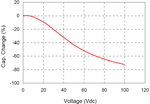ljille
Member level 2

Several times I and I think a lot of people have used a capacitor rated for 50 V when the specification is 25 V. But if you have a 500 V rated capacitor, for instance 2.2 nF, for a circuit of 5 or 12 volts, can we use it without problems or an impact on the circuit function?
That is, I understand the voltage specification refers to the isolation capability of the device, so, if it is bigger, it shouldn't affect the capacitance, but do somebody can answer if when this data is too different, do the 5 volts on the circuit be too low to achieve the capacitance rated by the manufacturer?
Thanks for your time
Luis
That is, I understand the voltage specification refers to the isolation capability of the device, so, if it is bigger, it shouldn't affect the capacitance, but do somebody can answer if when this data is too different, do the 5 volts on the circuit be too low to achieve the capacitance rated by the manufacturer?
Thanks for your time
Luis



